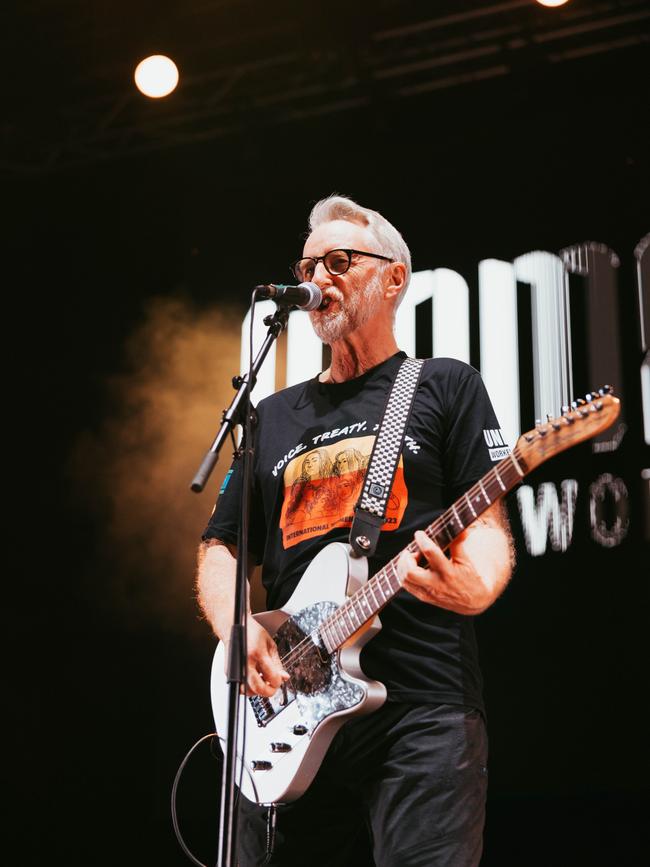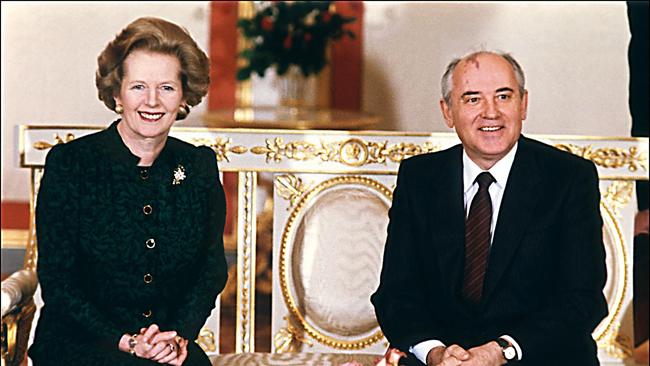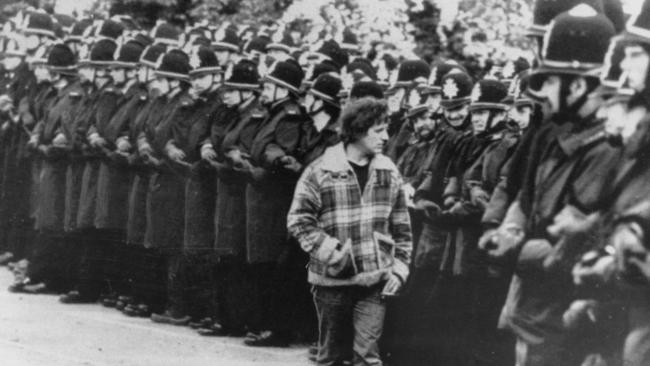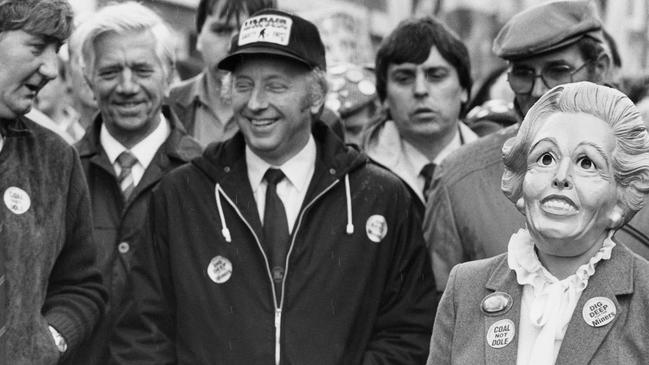What my first love taught me about the Left: they imagine better worlds while creating worse ones


In those decades, the left of which she was a proud and, I thought, typical member has been transformed.
Barbara (name changed) would now march not to keep coalmines open but to close them. Bragg would be too old/white male/working class (and thus need decolonising). The women’s rights marches Barbara joined in the 1980s she would now condemn as anti-trans. Only her anti-Americanism – the second most durable hatred on the left, after anti-Semitism – would endure.
The right has switched, too. Not as completely as the left but in important ways we often elide. This transposition of left and right conditions much of our contemporary politics but goes mostly unremarked.
In the ’80s, the Conservatives effectively closed the British coal industry. Barbara sent the picketing men blankets and goodwill. Today, “beautiful, clean coal” (Donald Trump’s phrase) is deified by those on the right. It speaks to man’s independence from the forces of cold nature. Scott Morrison held aloft a lump in parliament.
In the 2020s, it is the left that has assumed the four-decade-old Conservative position.
In Australia, Anthony Albanese and Energy Minister Chris Bowen vilify coal. Like Margaret Thatcher and Ian MacGregor, Thatcher’s head of the National Coal Board, Labor is plotting to throw every miner out of work.
Then, the right stood for middle-class values: marriage, family, low taxation, strong defences. Now, Australian Liberals trade on their working-class bona fides. In the US, Republicans tell defenestrated coalminers that they will be their voice. Democrats blame them for climate change. Barbara wept with the injustice of Thatcher’s assault on mining communities. Hillary Clinton now derides them as deplorables.

The right stood against the sexual revolution, free love and the consequences of the pill. Now it is the left that polices sex. Brittany Higgins, a young conservative woman (at least until Network Ten got to her), has become a poster child of the left’s obsession with sexual misconduct. The sex re-education programs on every university campus, warning of the perils of physical intimacy, are mandated by progressives, not by conservatives.
It used to be the religious right that told us to avoid sex. Now it is the cultural left. It was conservatives who criticised feminism. Now it is trans activists on the left. Indeed, it is Liberal women (such as Moira Deeming) who have paid the highest price for upholding a traditional conception of women’s rights. Many left-wing feminists have gone missing in action.
The left-right transposition is especially evident when it comes to race. It was small-C conservatives (often southern Democrats) in the US who wanted to maintain racial distinctions. Now it is the left that upholds race as the basic determinant of societal relations.
Conservative segregationists scoffed at Martin Luther King’s vision of a colourblind constitution. Now it is the left that condemns the reverend for his colour-blindness. We should hire, fire, promote and condemn based on race. MLK, left-wing anti-racists now tell us, was guilty of “content of character racism”.
Yes campaigners for the Indigenous voice wanted race written permanently into the Australian Constitution. No campaigners, representing most conservative voters, wanted it written out. When I was growing up near Leicester, then and still one of the most ethnically diverse cities in Britain, the far right demanded rights for indigenous Brits. In modern-day Australia, it is the left that makes the equivalent claim for First Nations people.

In Britain, asserting “indigenous rights” is racist. Here it is anti-racist. I have never been able to hear an acknowledgment of country here without thinking how bizarre it would sound in the English Midlands. “Sovereignty was never ceded!” sounds like an anti-EU Brexit slogan.
Why this ideological transposition? Losing wars changes the loser. And the left lost the biggest in its history in 1989.
My year with Barbara began the night the Berlin Wall fell (the other 9/11: November 9). We drank Blue Smirnoff, she in bemused sorrow, me in joyous irony; vodka was one of the few things the Soviet Union did well.
That night, the left lost the key economic argument of the 20th century: command economies don’t work, free-market ones do. People crave the opportunities of the latter. They will flee the former when given the chance.
My bearded university lecturers spent the ensuing years in a state of deep agitation. For many, the fall of communism coincided with their own midlife crises. It was wonderful. Today, zealously held but weak arguments are protected by speech codes and de-platforming. Then, men and women who had backed the Soviet project were subject to debate. Many did not like it.
The game plan thereafter was to establish a leftist catechism, grounded in a cultural revolution, the challenging of which would be heresy.
This “long march through the institutions”, as Rudi Dutschke, the young disciple of Italian Marxist Antonio Gramsci, described it, is reaching some sort of destination now. And what a scene of tedium and enervation it is.
Instead of debating big questions, we fly rainbow flags. Safe spaces have taken precedence over dangerous ideas.

When class war didn’t work, new kinds of oppression, to paraphrase the Communist Manifesto, new forms of struggle in place of the old ones, were found.
Climate, race and gender have replaced class as the source of left-wing fervour. These wars have been waged much more effectively. Their dialecticism – you are with us or against us, anti-racist or racist, pro-trans or transphobic – has enabled their colonisation of social media.
Marx claimed class war was inevitable. It proved not so. But culture war may well be. The US has been in a protracted one since Roe v Wade in 1973. Australia is flirting with its own version because of the voice debacle.

Climate denialism, structural racism, rape culture and transphobia. Collectively, these progressive priorities now have the quality of crisis. They are spectres haunting the West, to again adapt Marx’s rhetoric. Their negation now mobilises whole campuses and workplaces. Denying their salience, let alone standing against them, is hard to impossible.
In the US, if you want a university job, you will likely have to affirm, in writing and at interview, your contribution to their fighting. Australia is not quite there but we are inching closer. It is one of the forms of American cultural imperialism to which we are most susceptible.
I don’t know what Barbara would make of this transformation of the left. Sadly, dear reader, finding out would be a research project too far for me. I suspect she would be in sympathy with some of it. But much of it she would not recognise as the natural evolution from her 1989 platform.
She did teach me something vital, a lesson too few on the right imbibe. Those on the left are not bad people. They are not evil. But they are naive. They insist on realities that are fantasies. They seek final solutions to problems insoluble. They imagine better worlds while creating worse ones.
Timothy J. Lynch is professor of political science at the University of Melbourne.






The first woman I ever loved was an eco-feminist. She was radicalised by the 1984 British miners’ strike, listened to Billy Bragg on a C90 cassette tape, marched for women’s rights, admired communist East Germany and refused on principle to visit the US. In the 33 years since she dumped me, I don’t think she ever has.